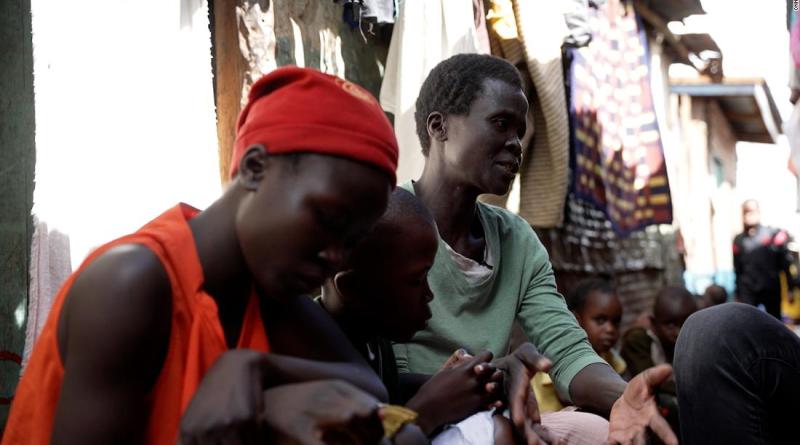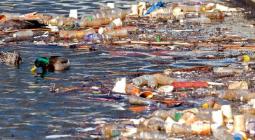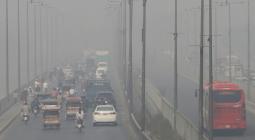Period poverty: How air pollution in Kenya could make periods heavier, more painful and more expensive

Every month, Alice Shikuku has to choose between buying enough food for her family and buying sanitary pads for her daughter.
Her family moved to Korogocho, one of the poorest slums in Nairobi, Kenya, four years ago, when the father of her children died. Not long after, she was forced to sell her sewing machine, her only source of income, so she could get treatment for an infection in her leg.
"Life became extremely difficult," Shikuku tells CNN while sitting outside her sheet-metal home alongside her children. "Today, I have nothing. There is a material I was given to sew, but I don't have a machine to do so."
On a good day, Shikuku can make around $1 (150 Kenyan shillings) washing clothes and cleaning houses, but the cheapest pads available in Korogocho cost 33 cents (50 Kenyan shillings).
That means her 14-year-old daughter, Mercy, often must go without. Last month, Mercy was sent home from school after her period caught her by surprise. And she regularly stays home if she doesn't have pads, to avoid embarrassment.
"She has heavy menses. During her periods, it stains her clothes," Shikuku explains.
This is what period poverty looks like, and it's a shared experience for millions across Kenya.
An estimated 65% of women and girls in the country can't afford basic necessities to manage their periods, according to a report from the US Agency for International Development. The half-dozen women and girls whom CNN spoke to in Nairobi say they regularly miss school because of this, a problem widely reported across Kenya.
New research suggests that poor air quality could make matters worse.
Studies have linked air pollution to an increased risk of endometriosis, a condition that causes tissue like what lines the womb to grow outside of the uterus. Endometriosis can cause severe pain and heavy bleeding during menstruation, among myriad other reproductive health problems.
In the United States, researchers found that girls who had higher exposure to fine particulate matter, a primary source of air pollution, in childhood and during their mothers' pregnancies had earlier timing of menarche, their first period.
Audrey Gaskins, the senior researcher of the study, tells CNN that although it's difficult to compare country-to-country, one of the primary concerns is what the effects would be in places that have much worse air pollution.
"One thing that we're seeing in the studies that we've been doing in the United States is that there's really no safe level of air pollution," says Gaskins, an associate professor at the Rollins School of Public Health at Emory University. "We want to keep it as absolutely low as possible."
Gaskins says the fact that research is still showing an impact on girls as early as in utero (before a baby is born) despite the lower levels of pollution in the US compared to some other countries "is terrifying".
Around the world in Taiwan, a study carried out by China Medical University in Taichung found that women exposed to the highest levels of air pollution were 33 times more likely to develop dysmenorrhea, or painful periods.
Taiwan has a well-established health system, says Oscar Lee, the vice superintendent of China Medical University. Compared with Kenya, women can more easily access anti-inflammatory drugs and birth control commonly used to manage painful periods. That discrepancy should be worrying, Lee tells CNN.
"We still have women [in Taiwan] in their reproductive ages suffering from this painful period caused by poor air quality, then think about those who live in developing countries," Lee says. "I think this is a major global health concern."
In the shadow of a toxic wasteland
No corresponding research on how poor air quality affects women's health has been done in Kenya, though many parts of Nairobi have dangerous levels of air pollution.
Just down the road from Shikuku's house in Korogocho sits Dandora, one of largest dump sites in the world. It was declared full more than 20 years ago, yet the sprawling 30-acre wasteland is still the final destination for the garbage of most of Nairobi's 5.3 million residents.
Thousands of scavengers trawl through the piles of discarded keyboards, cables and rubber to make a living, despite levels of air pollution there that regularly reach several times higher than what the World Health Organization considers safe for human health. Mountains of trash regularly ignite, releasing noxious gases that waft down to some of the most densely populated communities in the city.
"The dump site has so many other things that people inhale, and they don't know that is affecting them," says Emmie Erondanga, who grew up in the shadow of Dandora.
She now runs Miss Koch Kenya, a nonprofit to address the issues women and girls face in the Korogocho community, including period poverty. She worries that the environment is causing problems for the women of the slums in ways they may not fully understand.
"Sometimes, you have heavy periods because of the fumes that you're inhaling and difference in menses. Sometimes, you have cramps that are out of nowhere. I've experienced it myself."
The cost of period poverty
Erondanga laid bare to CNN what the cost of heavier periods may be for the girls of Korogocho.
She explains that a pack of sanitary pads may have seven or eight pieces in it. That may last a girl three to four days. But if her period lasts several days longer than that, she will need another pack.
"Can you afford it?" she asks. If not, then the girls have to find an alternative.
"An alternative will be 'I'll have to go to a man who has a little bit of more income to support me, and that man will tell me it's not for free.' So you have to pay. And what is paying?"
A survey carried out by Huru International, an international NGO that works to alleviate period poverty, in Mukuru and Mathare, other informal settlements in Nairobi, found that 16% of girls reported having to rely on boyfriends or men for money for sanitary pads.
"When girls are relying on men or boyfriends for pads, the only way they pay back for the products or the money they get is by engaging, in this case, in sexual behaviors," says Wanjiru Kepha, Huru's country director for Kenya.
Both Erondanga and Kepha confirmed that transactional sex for pads was common practice in Nairobi's poorest communities.
Much like the pads that led them to those choices, birth control and condoms are equally inaccessible. Girls end up with unwanted pregnancies and drop out of school, perpetuating a cycle of poverty.
"This is putting their lives at risk," Kepha says. "They are risking getting into childhood pregnancies, and this means it is really going to affect their entire livelihood."
While exchanging sex for pads carries some of the most extreme consequences of period poverty, it can also affect a girl's life in more subtle ways, in particular school attendance.
Kepha says there were two main factors causing girls to miss classes in the slums: lack of access to sanitary pads and painful menstruation.
That was the case for Damaris Atieno, who was 15 years old when she started her period in rural Kenya. It was so painful, she says, she skipped school for the entire week.
Sometimes, NGOs would come to her school and give out free pads, but they weren't always available. At one point, she had only one sanitary pad for her entire cycle. The next three months were even worse; she was forced to make do with only tissue paper and old clothes.
It took a toll on her self-esteem when people would tease her at school over having bloodstains on her pants, she tells CNN.
Her period caused her to miss out on more than school. She didn't feel comfortable going out with her friends because she was afraid the makeshift materials she used would drop down in front of them, so she would just stay home and sleep instead.
"I felt abandoned," Atieno says. "It was just there. I felt really terrible."
At first, Atieno talked to her mom about how she was feeling, but she soon realized it was making her mother feel guilty. So she decided to stop. "I just kept it to myself." Now 21 and living in Mukuru, Atieno is learning to sew at the Huru workshops. She wants to make her own clothes and sell them once she finishes the program. After being given packs of reusable pads by the organization, she says she's able to manage her period much more confidently but wishes more people were supportive of what women and girls like her go through.
"They [Kenyans] should not judge us. They should support us, show us they care," she says. "If they continue judging us, we feel shame. And we skip classes, we end up not achieving our goals because of their decisions to judge us. So they should just support us so that we can achieve our goals with no fear. They should just respect us."
Advocating for period policies
Sen. Gloria Orwoba is known as a champion of proper menstrual hygiene management, as well as ending period shaming and period poverty in Kenya.
The 37-year-old was catapulted to international attention earlier this year when she was asked to leave a Parliament session because of a bloodstain on her white suit pants. Sitting behind her desk in her understated office in Nairobi, she tells CNN she was "mad" at her expulsion.
"I feel like being asked to leave is using my womanhood to get me out of the table."
Orwoba agrees that women are not provided the care or support they need to manage their period in Kenya. She believes that the new research on air pollution should be a major concern for the millions of women struggling to manage their periods in Nairobi.
"Someone who can't afford sanitary pads, which right now, the cheapest is retailing at 50 shillings (approximately 32 cents) ... it's a stretch, (and) asking them to get the right painkiller for their cramps," she says.
The cheapest painkillers cost around six cents, or ten Kenyan shillings, for a pack of two. "Then you need to figure out, 'I can't go to work. I can't go to school. I can't do anything.'"
Part of President William Ruto's United Democratic Alliance party, she's been pushing for changes to the Kenyan government's policies around periods. She is fronting a $6.1 million (940 million Kenyan shillings) budgetary package aimed at distributing free sanitary pads to the millions of women and girls across the country who cannot afford them, and she runs several awareness campaigns around period shame.
Now, she tells CNN, targeted government intervention is needed to address the possible effects of air pollution on menstrual cycles. The first step toward a concrete policy, however, is more research, she says, and acknowledging that the impacts of climate change and pollution will be different for women.
"I'm hoping that somebody actually does research on how that pollution or environment affects women under sexual reproductive health rights."
"It will not only redefine what a menstrual cycle is, it will redefine the management of your menstrual cycle," she adds.





